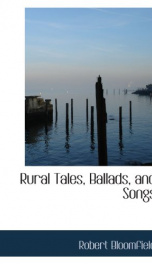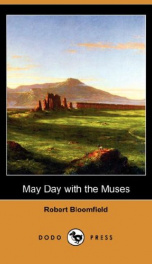Rural Tales, Ballads, and Songs

Robert Bloomfield (1766-1823), was an English poet. He was born of a poor family in the village of Honington, Suffolk. He apprenticed at the age of eleven to a farmer, but he was too small and frail for field labour, and four years later he went to London to work for a shoemaker under an elder brother, enduring extreme poverty. The poem that made his reputation was The Farmer's Boy: A Rural Poem (1800). The success of the poem was remarkable, over 25,000 copies being sold in the next two years. Bloomfield's poetry is smooth, correct, and characterised by taste and good feeling, but lacks fire and energy. Of amiable and simple character, he was lacking in self-reliance. Bloomfield's reputation was increased by the appearance of his Rural Tales (1802), News from the Farm (1804), Wild Flowers; or, Pastoral and Local Poetry (1806) and The Banks of the Wye (1811). His Remains in Poetry and Verse appeared in 1824. --This text refers to an alternate Paperback edition.
Info about the book
Author:
Series:
Unknown
ISBN:
1115108808
Rating:
3/5 (3)Your rating:
0/5
Languge:
English
Users who have this book
Users who want this book
What readers are saying
What do you think? Write your own comment on this book!
write a commentGenre
if you like Rural Tales, Ballads, and Songs try:
Do you want to exchange books? It’s EASY!
Get registered and find other users who want to give their favourite books to good hands!




